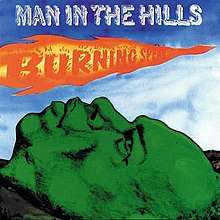Man in the Hills
Man in the Hills is a reggae album by Jamaican musician Burning Spear (Winston Rodney), released in 1976 (see 1976 in music) on Island Records. Man in the Hills was follow-up to the seminal Marcus Garvey; Man in the Hills is usually considered a worthy follow-up, though less innovative and incendiary. produced by Jack Ruby, Man in the Hills is a simple and unadorned album, with songs that reminisce about Spear's childhood in St. Anne's Bay, Jamaica.
| Man in the Hills | ||||
|---|---|---|---|---|
 | ||||
| Studio album by | ||||
| Released | August 18, 1976 | |||
| Recorded | Randy's Recording Studio & Harry J's Recording Studio, Kingston, Jamaica | |||
| Genre | Reggae | |||
| Length | 33:53 | |||
| Label | Island | |||
| Producer | Jack Ruby | |||
| Burning Spear chronology | ||||
| ||||
| Review scores | |
|---|---|
| Source | Rating |
| AllMusic | |
| Christgau's Record Guide | B+[1] |
| Rolling Stone | (Favorable) RS 222, September, 1976 |
| PopMatters | (Favorable) link |
"Door Peep" was originally recorded in 1969 at Studio One after Spear ran into Bob Marley (also from St. Anne's Bay); Spear later quotes Marley "And Bob was going to his farm. The man was moving with a donkey and some buckets and a fork, and cutlass and plants. We just reason man-to-man and I-man say wherein I would like to get involved in the music business. And Bob say, 'All right, just check Studio One.' " The single was released but fared poorly on the Jamaican charts.
After Marcus Garvey, Spear's fame had grown considerably, and he was a star in Jamaica and cult sensation in the United Kingdom. Man in the Hills was a much quieter and more restrained album than its predecessor, and was more pastoral and dreamlike than militant and radical (though songs like "Is It Good" and "No More War" continue to address social issues).
"Man in the Hills", the titular album opener evokes the superiority of rural living over urban. In Jamaican history, the roots of radical protest, a national identity and the Rastafari movement, grew from communities formed by escaped slaves in the hills and (after emancipation in 1838) the so-called "Free Villages".
Track listing
- "Man in the Hills" (Rodney) – 4:00
- "It's Good" (Phillip Fullwood, Rodney) – 2:45
- "No More War" (Rodney) – 3:19
- "Black Soul" (Rodney) – 3:25
- "Lion" (Rodney) – 3:14
- "People Get Ready" (Rodney) – 3:22
- "Children" (Rodney) – 3:44
- "Mother" (Rodney) – 3:37
- "Door Peep" (Rodney) – 2:40
- "Groovy" (Rodney) – 3:53
Credits
- Recorded at Randy's Recording Studio, North Parade; and Harry J Studio, Roosevelt Avenue, Kingston, Jamaica
- Original album design and illustration: Neville Garrick
Musicians
- Winston Rodney – lead vocals and percussion
- Delroy Hines – harmony vocals
- Rupert Willington – harmony vocals
- Robbie Shakespeare – bass
- Aston "Family Man" Barrett – bass
- Leroy "Horsemouth" Wallace – drums
- Bernard "Touter" Harvey – keyboards
- Earl "Wire" Lindo – keyboards
- Tyrone "Organ D" Downie – keyboards
- Earl "Chinna" Smith – lead and rhythm guitar
- Tony Chin – rhythm guitar
- Bobby Ellis – trumpet
- Richard "Dirty Harry" Hall – tenor saxophone
- Herman Marquis – alto saxophone
- Vincent "Trommie" Gordon – trombone
References
- Christgau, Robert (1981). "Consumer Guide '70s: B". Christgau's Record Guide: Rock Albums of the Seventies. Ticknor & Fields. ISBN 089919026X. Retrieved February 22, 2019 – via robertchristgau.com.